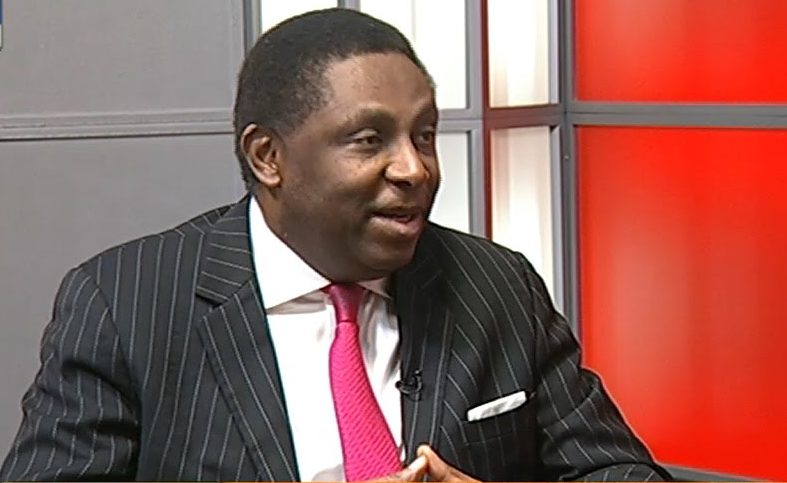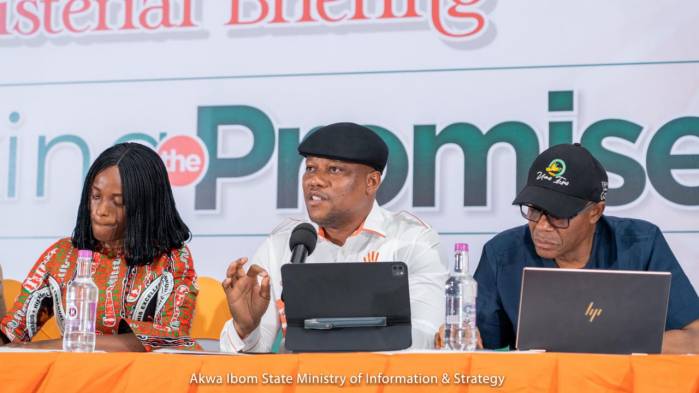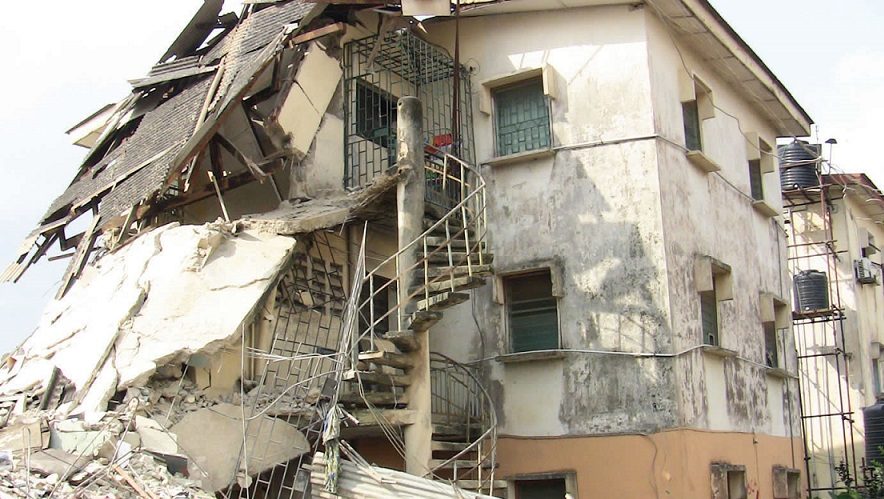Mr. Adetilewa Adebajo, is the CEO of The CFG Advisory, a financial advisory services company. In this interview with our Assistant Editor, CHINWE MADUAGWU, he X-rays the problems of Nigeria’s economy and proffers solutions.
Taking a look at our economy, he says: “When you talk about coming out of recession, it is important that we focus on a very significant economic indicator. One of the key benchmarks of any economy that is non-negotiable index is that your population must be growing faster than your rate of Gross Domestic Product (GDP). Coming out of recession does not mean anything if your economy is not growing as fast as your population.
TNE: Recently, the former Central Bank Governor, Prof. Charles Soludo, was quoted as saying Nigeria is the world poverty capital. Do you agree with that assessment?
I don’t have the facts. He must have said that within a context, maybe he looked at our per capita Gross Domestic Product (GDP), maybe our ranking is low, so I have to look at the data and understand the framework within which he said so. However, we can not deny also the fact that a lot of our population is surviving on a very low income on a daily basis and then the level of unemployment. We can’t discountenace it. From a personality of that nature, we must understand where he is coming from before we make any comments.
TNE: On the one hand, we are told that we have exited recession, our GDP is growing and here you are saying that many Nigerians are surviving on very low income meaning the poverty level is very high here; is that not an anomaly?
Well, there’s what is called GDP per capita, also when you look at the misery index, and the poverty index, there are many standards that the World Bank has set up and, of course, if you take a look at the size of our population and the amount of the middle class we have it’s very low. And, of course, people living below subsistence, there’s no question about that and I think these are issues we need to address. When you talk about coming out of recession, I think it is important that we focus on a very significant economic indicator.
One of the key bench marks of any economy that is a non-negotiable index, is that your population must be growing faster than your rate of GDP. Coming out of recession does not mean anything if your economy is not growing as fast as your population. Our population is growing at about three per cent per anuum and for the last three years our economy has not achieved growth of up to three per cent. Yes, we are out of recession and coming up, but what that means is that we are three years behind in terms of economic growth and that’s something we need to make up in order to keep up. If we are not keeping up then that means that there is a significant problem and that’s something we need to address.
We need to, however, note that our GDP puts us as the top economy in Africa and probably the 22nd largest economy globally. One has to be very careful in taking a look at all these indices because our population is fast becoming a liability instead of an asset. That’s really where the challenge is.
TNE: You said we are three years behind in our economic growth, so what do we need to do to grow the economy to catch up with the population?
First of all, luckily now the rate of inflation is coming down and interest rates are coming down. If you have interest rates of 30 per cent, it is highly unlikely that anyone will be able to borrow at those rates to be able to stimulate economic growth. In most of the developed countries, when they are in recession, they slash their interest rate to be able to stimulate growth. We need to start looking into an economic model whereby we bring our rates down. Now that inflation has come down to about 12 per cent; it’s been on a downward trajectory for a very long time, we should have cut rates because some of these indicators are leading indicators while some of them are lagging. You have to make a policy with a leading indicator of interest rate cut to be able to stimulate and accelerate that lagging indicator of slowing down inflation so that your policy actions can be more accelerated. We are getting there but at the same time I think it’s just not happening fast enough. The timeline is very slow and I think that’s where we have the problem of trying to get things going.
The fiscal policy is also very important. The government has said it is going to increase CapEX (Capital Expenditure) and create the stimulus to be able to spur the economic growth, but unfortunately the budget is only being passed and the level of capital expenditure that should have been in the system is not optimal to be able to stimulate growth.
Then, of course, the insecurity in the country is an issue. You find a situation where foreign direct investments and foreign portforlio investments are not working. We got out of the JP Morgan index, that has affected us significantly . We are just now beginning to approach some level of confidence with the new NAFEX window. I think they have restored confidence to the portfolio investors. We are beginning to see new inflow of dollars which helps us. Even though people talk about the oil prices, and all kinds of other things, at the end of the day the fundamentals of our economy must be sound for us to be able to achieve this growth and attract the right investments.
This government made a lot of mistakes in the early days, they have realised those mistakes and have corrected them. They’ve put up this economic recovery growth plan, but unfortunately, like I said, an economy is about leading and lagging indicators so that GDP growth we are looking for, there are many factors affecting it which includes confidence, which they have not provided that will get the stimulus for not only government but the private sector to be able to go ahead and continue working. Most businesses are just maintaining what they have and ensuring profitability by sound business management, cutting costs, looking at the market, repositioning their brands. But the sort of expansion projects we used to see have all slowed down and that’s where you see growth. Everybody wants to see that their business is profitable, so they are going to downsize, and rightsize to ensure that their business is profitable. That’s also why we have record levels of unemployment and that’s a challenge because we need to bring these people back into the productive procesess in order to be able to increase capacity. These are some of the things we are talking about that will be able to stimulate the economy.
But you know it wasn’t just a recession that we had. Our economy crashed. It was an economic crash from about 8 per cent to about -2 per cent in the space of a year. That’s unprecedented.
TNE: You just mentioned the economic recovery growth plan, would you say that it is on course?
We can say that it is on course. You see, one of the problems we had with the economy was inflation, which was persistently high and that was because of food inflation; and there is a direct correlation between that and the problems in the North East of the country. All the people who are now in the IDP camps were productive Nigerians who were producing agricultural produce and adding it to the market. But because they don’t have that productive capacity anymore, we began to see high food inflations. Then the crisis moved into Benue, another food basket, with all these problems, you can see the direct correlation of all those indices in terms of food prices. If we don’t resolve all those issues, we have to now wait for the harvest from the rest of the country to begin to get the situation away from where the prices are going down. That‘s why we had that problem.
Clearly, yes, it is on track, the plan is there, but the government expenditure is not yet available because of the budget, again. You can see that there are other factors that are self-inflicted. If you had passed your budget in December and you had started the spending, by now that stimulus will begin to put in place all other sorts of things. We are lucky oil prices are going up, even then, we borrowed some money to boost our foreign reserve.
Again, government also has challenges because government debt was an issue last year in terms of about 65 per cent of revenue were going towards debt service and they are still trying to restructure the debt portfolio and that was at the time when inflation was very high and treasury bills had to be high. That was why we were telling government it needed to cut rates because it was hurting also. The government was paying too much in treasury bills, banks will stop lending, they will just mop up funds and put it back on treasury bills. That’s a no brainer; you go to sleep and you make your margins. These distortions in the economy are what was retarding the growth because even production capitals were going into treasury bills rather than into investments that will yield growth. Putting money into treasury bills will not give you the growth stimulus you need, it just gives the financial intermediaries the return. The government needs to correct all those things and then put up sustainable programmes backed with political will to be able to restore confidence. But again, because of the elections coming next year everybody is just waiting to see what will happen and that’s why you don’t see that desired push because even though there might be a structure on ground to be able to get things moving, because of the way we run our elections and politics, people just shut down and adopt a wait-and-let’s-see what happens attitude, whether he’s going to continue the policies or not. Because somebody who did a first term can decide in the second term to change the whole policies or another person can come in with his own policies, nobody knows. Uncertainty of the political transition process would also restrict growth in the economy.
TNE: In other climes, government policies outlive individual office holders to a large extent but it is not so here. Once it’s election time, businesses and even governance shuts down, why is that so?
It’s really a shame, but it’s all about our attitude. When we have that sort of attitude towards elections people cannot be assured that the democratic processes will be smooth then you create that uncertainty so that instead of me planning for an 8 -10 year project, if you ask me to come and do a major 10 year development project, l will look at you and ask what will happen when the government changes; somebody can come and cancel my investment. So with all that uncertainty within the system, you cannot attract long term development capital, which will help to build your infrastructure . We are not only losing out on the political process but we are losing out on key investments. If you have long term guarantees for people then they can bring in their money here long term. That’s why we have more of the portfolio investors. You can see those portfolio investors, they are going to have a plan for these companies up until December. By that December, they would have bought all their forward FX (Foreign Exchange) when they came in from the NAFEX window. They would have looked at the dividends that these companies will yield by December and they would buy their forwards to be able to exit the market by then. So all of a sudden they will exit, all of a sudden the prices will go down again and they are out. Some of them will take some risks and then wait till after elections and then decide whether they come back again. But in other jurisdictions, it’s a seemless process.
READ ALSO: SPORTS FLAKES: LONG ROAD TO LONG JUMP GOLD
TNE: You talked about us being lucky that oil prices went up. A lot of countries are looking beyond fuel as a source of energy. Many have said they will phase out cars running on fuel in a couple of years. Yet we are stuck on oil as the major, if not only source of foreign exchange. When these other countries no longer need our oil, what will become of our economy?
First, the car manufacturers will be charging us a premium if we are still using cars running on fossil fuel. But the question will be even if we have our refineries and are refining our oil, who’s going to buy it at that point in time. Maybe we will be using our fuel by ourselves. When we can’t sell it to those guys anymore, we can call them to come and set up assembly plants here but at the end of the day you realise that you are dwelling in the past. It’s a challenge because the world is moving forward and the big countries, Norway, for instance, that has the largest Sovereign Wealth Fund has told it’s sovereign wealth fund to start divesting from petroleum stocks as an oil producing country because they don’t see it sustainable in future. Here, we are not even able to build a refinery of our own. Oil is our bane in this country and our economy and government survive based on oil prices. This government has seen oil price as low as 28 dollars and now as high as 70 dollars.
TNE: Before the discovery of oil in the country Nigeria had some agricultural products as foreign exchange earners and those things are still in the country. What’s the difficulty in exporting oil along side these other products?
Everybody wants to go the easy route. It’s called the path of easy resistance and low hanging fruits. All the other things you are talking about require a lot of work and nobody wants to do that. If you can go to Abuja and somebody writes you a piece of paper and you become an instant billionaire why would you want to come and set up 50, 000 hectares of oil palm plantation or why would I start a 10,000 hectares of soya beans when I can open an LCN and import things. If your policies are not right or you don’t get the right incentives, this is what you get and you can’t complain about it.
TNE: Corruption is said to be one of the major problems of this country and the present government came in on the promise of fighting corruption. What’s your assessment of that fight so far?
I don’t have any idea in all honesty because there’s so much conflicting information out there even on EFCC’s website. For instance, how many convictions, what are they doing? There are so many cases that are stuck in court. Then all of a sudden there’s now political fighting; they brought out a list of looters and the looters are saying where’s the judgement that pronounced me a looter. We really need to take another look at the whole process so as to restore peoples’ confidence in it. That’s very important because fighting corruption is something we have to take serious. We hear stories of returned or recovered looted funds being looted again. If we can get a standard narrative, then one can make better informed comments, but we really need to take the issue very serious.
TNE: In your view, what is the greatest challenge to growing our economy?
It is confidence and political leadership. When you don’t have business confidence and there is no confidence in political leadership, it is a problem. Then we have the security situation, which has transcended from Boko Haram to Fulani Herdsmen. Nigeria is a big country. It’s not just about Lagos or Abuja or Port Harcourt being okay, it’s about Nigeria being okay. If Nigeria is not okay, there’s not much that can go on else where.
TNE: If you find yourself at Aso Rock as the leader of this country, what policies would you put in place to move the country forward?
The first thing would be to resolve the security issues because if you don’t resolve the security issues and provide an enabling environment for investors especially locally based investors; Nigerians who have the capacity to spend their money here, those who have capacity to go into small scale industries but are afraid because of government policies or they can’t borrow at 30 per cent. This is necessary because if we don’t have that why would we expect the big companies to come. For me, what is important is to create an environment that is secure and safe for people.
Then you create the enabling environment by making sure your policies are stable and consistent and you also as government, run the government responsibly so that you are not just having a deficit, you can’t balance your budget and you are spending money on things that are not sustainable. If you run a responsible government and right size the government, then everything else will follow. That’s the way I see it. There are basic things that should be tidied up. The potentials of this economy are enormous; even without power, without infrastructure and other things we are the number one economy in Africa.
If I go to Aso Rock I’m inheriting the number one economy in Africa and the 22nd in the world. My objective will be to take Nigeria out of the G20 economy. With what we have here that are not even exploited we are number one in Africa so let’s explore them and make sure that at least we are a G10 economy. Nigeria belongs to the top 10 economies globally. If I was there, my focus would shift -with all this mess we are still number one, so we have to get our acts together, looking at the big picture to create an enabling environment for everybody else to come in, and run a responsible government; lean and mean, policies put in place, laws enacted and then let people do what they are supposed to do.
TNE: When you say right size the government, what are you thinking?
You hear about ghost workers and the rest. Look at what is happening in the health sector. Does the government really want to be paying all these teaching hospitals? There has to be a sustainable model whereby people have to pay for things and for people who can’t pay, there needs to be some sort of basic primary health care and insurance has to be able to pick up some of the gaps. If you begin to free up a lot of government expenditure in all these things and put resources into primary health care, you can have state of the art facilities in the teaching hospitals and be able to reach the masses. Then the teaching hospitals will now be able to run on a profitable level, but the government has to find a way to subsidise those teaching hospitals to be able to treat those who have been identified as not being able to pay based on referrals from the primary health care level. You can’t just go and get a subsidised treatment at the teaching hospitals, you have to be referred from the primary health care sector.
The same thing with the education sector. While you may talk about free education, I don’t think tertiary education can be free. People have to find scholarships and grants to be able to get into university so you can pay those professors properly. Secondary and primary education, the government should be able to use the tax base to support those, there’s no question about that. But tertiary education, there should be a sort of payment mechanism. Capable students might be given students’ loans whereby they go to school and when they start working, they can pay back. All these things need to be institutionalised and made clear. There is also need to get private sector involved. Government alone cannot do this.
When you free government from all these things, there’s more capital to spend on what government needs to spend money on like primary health care, primary education and the security of the nation; the security services – the Army, the Police, the Navy, and the Airforce. Government also needs to work more with the state governments, let them pick up some of the responsibilities. I’m not an advocate of state police but I think the government should allow more autonomy for the states to work, like Lagos State has done with the Lagos State Security Trust Fund. There should be a programme whereby the states are contributing towards policing in their state so that people can see what the Federal Government is bringing in and what the state can add.
To do state policing in the country now, the governors are not that mature; before you know what is happening they will turn it into their private security. We are not there yet, but there should be more support from the states and then the federal government can concentrate on what it’s supposed to do. Also, some of the things the government should not be doing, it should privatise including some of the teaching hospitals, but then they should have a mandate that if they have referrals from the primary health care centres they should pick those up. Government should have some sort grants and funding for the teaching hospitals so that they are not fully commercial entities, but they can be allowed to be able to charge privately such that in the teaching hospitals you can have private wards and charge commercially though that should not be the focus.
These are some innovations we need to encourage so that you take care of society. Like I said, in spite or despite what is going on we are still the largest economy in Africa and Lagos is the 5th largest economy in Africa so what’s the problem with us?
TNE: Talking about our problems, why is power generation still an issue in the country?
It’s about investments and return. The way the government is regulating the industry does not allow investors to make their money back in terms of pricing especially for gas. By the time the generating companies get the gas, government will increase the price of the gas they are passing on to the generating companies but they will allow them to pass on the cost to the consumers. There’s still a lot of distortions in the pricing mechanism they need to resolve. If they put out the true cost of power, you’ll find out that there’s a problem.
There’s also mismanagement by all these companies. There are a whole lot of issues; the distribution network, getting the grid, supply of electricity from the centre, what is the quality of electricity and even though they are transmitting, there are a lot of transmission losses. There are all kinds of infrastructural challenges that we have and, of course, we don’t make the investment because as the population is growing you are supposed to be expanding. It’s all about planning and we don’t have long term planning because of uncertainty. Someone can come and change any policy whereas we should have a national policy enacted by law so whoever comes works with it. There needs to be a plan taking into cognizance population growth and capacity to generate, because electricity is not plug and play. So in all those things that involve long term planning, Nigeria has failed; building refineries, maintaining infrastructure, all those big, long term infrastructural projects, Nigeria has failed.











